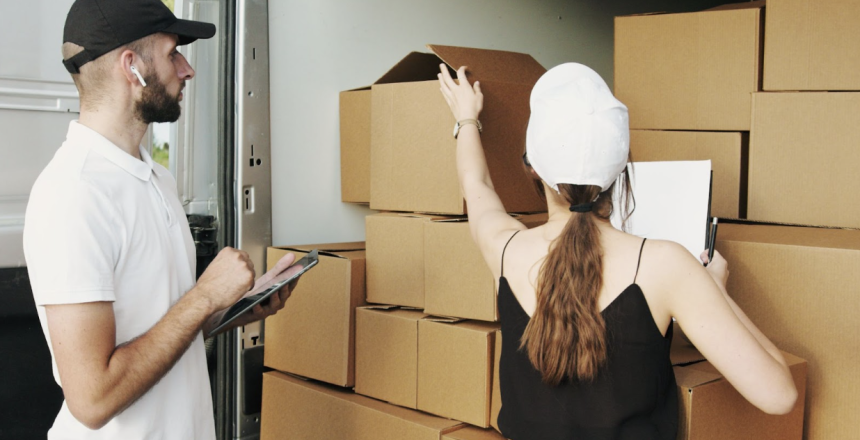If you’re planning to move out of state in 2024, you’re probably feeling a mixture of emotions – excitement, anticipation, and possibly even a little anxiety. Moving to a new state can be exhilarating, but it also requires careful planning and organization.
That’s why we’ve created this comprehensive moving out of state checklist to guide you through the entire process, from start to finish. We’ll cover everything you need to consider for your interstate move in 2024, including planning, logistics, packing, and settling in your new state.
The Complete Moving Out of State Checklist
Moving out of state can be a complex process. Here’s a comprehensive checklist to help you stay organized:
Two Months Before Moving:
- Research your new area for housing, schools, and employment.
- Create a budget for moving expenses.
- Start sorting through your belongings, deciding what to keep, sell, donate, or discard.
- Begin researching moving companies or truck rental options.
- Collect important documents (birth certificates, passports, etc.) in one place.
Six Weeks Before Moving:
- Notify your landlord or put your house on the market, if applicable.
- Start using up items that can’t be moved, like frozen foods and cleaning supplies.
- Order packing supplies like boxes, tape, and bubble wrap.
- Begin packing non-essential items.
One Month Before Moving:
- Choose a moving company or reserve a moving truck.
- Start packing in earnest.
- Notify utility companies of your move-out date and arrange for services at your new home.
- Change your address with the post office.
- Notify banks, insurance companies, and other important institutions of your move.
- Arrange for school records to be transferred, if you have children.
Two Weeks Before Moving:
- Plan for the transportation of pets and plants.
- Confirm travel arrangements (flights, hotels, etc.).
- Confirm moving details with the moving company.
- Begin deep cleaning the house.
One Week Before Moving
- Finish most of your packing.
- Set aside an essentials box for things you’ll need right away in your new home.
- Confirm the moving day schedule.
- Check prescriptions are filled and easily accessible.
Moving Day:
- Supervise the movers and ensure everything is accounted for during loading.
- Perform a final walk-through of your home.
- Keep important documents and valuables with you.
After Arriving:
- Unpack essential items first.
- Inspect delivered items for damage and report any to the moving company.
- Set up utilities if not already done.
- Update your driver’s license and vehicle registration.
- Explore your new neighborhood and introduce yourself to neighbors.
Remember, every move is unique, so adjust this checklist as needed to fit your specific situation.
Before the Move: Choose the Right Moving Company
Choosing the right moving company can make all the difference when it comes to a smooth and stress-free out-of-state move.
Here are some factors to consider to ensure you choose the right company:
- Licensing and insurance: Make sure the moving company has a valid license and insurance to protect your belongings during the move.
- Experience: Look for a company with experience in interstate moving services, as they are more familiar with the nuances of such moves.
- Professionalism: Check if the company has a professional website, prompt customer service and courteous staff to handle your queries.
- Transparent pricing: Get multiple quotes and compare the services offered along with the prices. Beware of any hidden fees that may arise later on.
Reviews and recommendations: Look for reviews and recommendations from previous customers before finalizing the company. This can give you a good idea about their reliability and service quality.
Will You Drive Or Ship Your Car?
Deciding whether to drive or ship your car for an out-of-state move is a significant choice. You need to consider factors like time, cost, convenience, and vehicle wear.
Driving long distances can be exhausting and expensive, considering fuel, accommodation, and potential car maintenance.
Conversely, shipping with Mercury Auto Transport offers a hassle-free experience. They ensure safety and efficiency, saving you time and preserving your vehicle’s condition.
Get a free quote today or speak with one of our professional auto transport representatives and experience seamless and reliable auto transport services.
By taking these factors into account, you can select a moving company that meets your needs and ensures a successful move.
Before the Move: Research Your New State
Moving to a new state can be a daunting experience, especially if you’re unfamiliar with the area. That’s why it’s important to research your new state beforehand.
By gathering information about housing, schools, healthcare facilities, transportation, and local regulations, you can better prepare yourself for the move and make a smoother transition.
Start by researching the housing market in your new state. Look for neighborhoods that fit your budget and lifestyle, and consider factors such as proximity to work and schools. You can also research real estate agents who can help you find your perfect home.
Schools are another important factor to consider, especially if you have children. Look for top-rated schools in your area and research the admission process. You can also connect with other parents in your new community to get firsthand information.
Healthcare facilities are crucial, especially if you have pre-existing medical conditions. Research hospitals and clinics in your area and check if they accept your insurance. Additionally, look for primary care physicians and dentists.
Transportation is also important to consider. Research the local public transportation system, including bus and subway routes, and look for nearby airports if you need to travel frequently. You can also research car rental services if you don’t own a car yet.
Finally, familiarize yourself with the local regulations. Look for information on taxes, voting, and other legal requirements. You can visit the state’s official website or attend local government meetings to learn more.
Useful Resources for Researching Your New State
| Category | Resource |
| Housing | Zillow |
| Schools | GreatSchools |
| Healthcare | Healthgrades |
| Transportation | Google Maps |
| Legal | State’s official website |
Before the Move: Create a Moving Budget
| Expense | Estimated Cost |
| Packing Supplies | $300-$500 |
| Transportation Costs (Truck Rental, Fuel, etc.) | $1,000-$2,000 |
| Storage Fees | $100-$300/month |
| Other Miscellaneous Fees (e.g., Cleaning, Moving Insurance, etc.) | $500-$1000 |
- Declutter your possessions to reduce the costs of packing supplies and transportation costs.
- Compare prices and services of different moving companies to find the best deal.
- Pack items yourself instead of hiring movers to do it for you, but be mindful of time constraints and proper packing techniques.
- If you have a tight moving budget, consider moving during off-peak seasons or mid-week when prices may be lower.
Before the Move: Organize Your Belongings
Moving to a new state provides you with the perfect opportunity to declutter and organize your belongings. This process will not only help you simplify the move but also ensure you don’t carry unwanted items with you to your new home.
It’s essential to have a plan and stick to it to make this process smooth and effective.
Decluttering Before a Move
The first step in organizing your belongings is decluttering. Sort your items into categories such as keep, donate, sell, or discard. For example, you can keep items that you use frequently or those with sentimental value.
Don’t hold onto items that you haven’t used in years or those that don’t hold any emotional value. Use this move as a chance to eliminate clutter and free up some space in your life.
For items you can donate, you can choose a local charity or non-profit organization. Ensure you’re aware of what they accept and their donation policies. Items you can sell, such as furniture or electronics, can be sold online or at a garage sale.
Efficiently Packing and Labeling Your Belongings
Once you’ve sorted your belongings, the next step is packing and labeling them efficiently. Start by packing items you don’t need immediately. For example, extra linens, dishes, and some clothing can be packed weeks before the move.
Use sturdy boxes and packing tape to ensure your items are secure during transportation. Label each box with a brief description of its contents and an identification number.
Keep a list to track your boxes and items, and take pictures of expensive items for insurance purposes.
When it comes to fragile items, use bubble wrap, packing paper, or towels to cushion them. Place them in the boxes carefully and label them as fragile.
Efficiently packing and labeling your belongings will make it easier to unpack and settle in your new home. You’ll be able to locate the items you need quickly, and it also makes it easier to keep an inventory of your belongings.
Overall, the key to organizing your belongings is to start early, declutter, and efficiently pack and label your items. This way, you’ll be able to focus on adjusting to your new home and surroundings without the added stress of clutter and disorganization.
Packing Tips and Strategies
When it comes to packing for an out-of-state move, it’s important to have a plan in place. Here are some practical packing tips and strategies to help you make the process more manageable:
- Start early: Don’t wait until the last minute to start packing. Begin the process at least a few weeks before your moving date so that you have enough time to pack everything properly.
- Declutter: Take some time to go through your belongings and decide what you don’t need or want to bring with you to your new state. You can donate or sell items that you no longer need to lighten your load and save on moving costs.
- Acquire the necessary moving supplies: Stock up on packing materials such as boxes, bubble wrap, packing paper, and tape. You can purchase these from your moving company or from a local home improvement store.
- Label and organize: Be sure to label each box with its contents and the room it belongs in. This will make unpacking much easier when you arrive at your new home. Consider color-coding boxes for extra organization.
- Pack fragile items with care: Use bubble wrap, packing paper, and sturdy boxes to protect fragile items during transport. You can also pack delicate items in laundry baskets or suitcases to save on packing materials.
- Take apart furniture: Disassemble large furniture items to make them easier to transport.
- Use a packing guide: If you’re not sure how to pack certain items, consider consulting a packing guide or asking your moving company for advice.
Following these tips and strategies will help you pack your belongings safely and efficiently for your out-of-state move. Don’t hesitate to ask your moving company for additional packing advice and guidance.
During the Move: Coordinate Your Move
- Book your movers well in advance to ensure availability on your preferred date.
- Consider the time of year and weather conditions that may impact your move.
- Label your boxes by room to make unloading and unpacking easier.
| Item | Tip |
| Pets | Make sure to check with your new state’s regulations regarding pet registration and vaccinations. If you’re traveling by car, plan ahead for any necessary stops for your furry friends. |
| Plants | Consider donating or gifting your plants to friends or family, as they may not survive the move. If you do bring them along, make sure they are properly wrapped and watered. |
| Valuables | It’s recommended to personally transport any valuable items, such as jewelry or important documents, to ensure they don’t get lost or damaged during the move. |
After the Move: Settling In Your New State
Moving to a new state can be both exciting and daunting. Once you arrive in your new location, you will need to adjust and find your footing. Here are some tips on how to settle into your new surroundings:
Find Local Services
Research and find local services to help you settle in. This may include finding a new healthcare provider, registering for utilities, and locating nearby grocery stores and malls. Check online directories or ask for recommendations from your new neighbors.
Explore Your Neighborhood
Get to know your new neighborhood by exploring its amenities, parks, and schools. Take a stroll or bike ride around your area. Make a list of local attractions and activities and try to attend some events. This will help you feel more familiar and comfortable in your new home.
Join Social Groups
Joining social groups can help you meet new people and build connections. Check local listings for groups or clubs you may be interested in joining, such as recreational sports teams, book clubs, or volunteer organizations. Meetup.com or Facebook Events are excellent places to find and connect with groups in your area.
Register for Local Services
Register for local services such as public transportation and the library. Local services open up opportunities to connect with the community and participate in various events and activities. If you have children, enroll them in local schools and programs to get them engaged and invested in your new community.
By following these tips, you can make the transition to your new state smoother and more enjoyable. Remember that adjusting to a new location takes time, so be patient and open to new experiences.
Before and After Moving: Updating Your Address and Legal Documents
| Place to update | When to update |
| Banks and credit card companies | As soon as possible after moving |
| Utility companies (gas, electric, water, internet, etc.) | 2 weeks before moving |
| DMV (Driver’s License and Car Registration) | Within first 30 days of moving |
| Voter Registration | 1-2 weeks before election day (varies by state) |
| IRS and other government agencies (such as Social Security, Medicare, and USPS) | As soon as possible after moving |
| Insurance providers (such as car, renter’s, or home insurance) | As soon as possible after moving |
| Employer and other important contacts (such as doctor’s office) | As soon as possible after moving |
| Subscriptions (such as magazines or newspapers) | As soon as possible after moving |
- Your driver’s license and car registration
- Your voter registration
- Your passport
- Your will and other legal documents
Conclusion
As you embark on the thrilling yet intricate journey of moving out of state in 2024, it’s crucial to be well-prepared. This involves selecting a trustworthy moving company, researching your new state, setting a budget, organizing and decluttering your belongings, updating your address and legal documents, packing efficiently, coordinating your move, and settling in.
Mercury Auto Transport, a seasoned auto transport broker, can handle your car shipping needs. We offer competitive rates through a network of FMCSA (Federal Motor Carrier and Safety Administration) -licensed and insured carriers, ensuring seamless and reliable auto transport. Get a free quote and experience stress-free car transportation as part of your moving adventure.
We hope this guide has been helpful to you. Moving out of state can be challenging, but with careful planning and the right checklist, it can also be a rewarding experience. Good luck with your move!
Frequently Asked Questions About Moving Out of State
What is an interstate move?
An interstate move is a relocation from one state to another. It involves crossing state lines and may require additional considerations due to different regulations and logistics.
How do I choose the right moving company for an interstate move?
When choosing a moving company for an interstate move, consider factors such as their license and insurance, reputation, experience, services offered, and pricing. It’s also beneficial to get multiple quotes, compare services, and read reviews to make an informed decision.
What should I research about my new state before moving?
Before moving to a new state, research important aspects such as housing, schools, healthcare facilities, transportation options, local regulations, and any specific information relevant to your needs and preferences. This will help you familiarize yourself with your new surroundings and make an easier transition.
How can I create a moving budget for an out-of-state move?
Creating a moving budget for an out-of-state move involves estimating expenses such as packing supplies, transportation costs, storage fees, and other miscellaneous fees. You can also save money by exploring cost-saving strategies and comparing prices for different services.
What tips can you provide for organizing belongings before a move?
Before a move, it’s helpful to declutter and organize your belongings. Sort through your items, donate or sell things you no longer need, and efficiently pack and label your belongings to simplify the unpacking process in your new home.
What documents and addresses do I need to update when moving out of state?
When moving out of state, it’s important to update your address with relevant entities such as banks, utility companies, government agencies, and subscriptions. Additionally, don’t forget to update important legal documents like your driver’s license and voter registration.
What packing tips can you share for an out-of-state move?
Packing for an out-of-state move can be made easier with the right tips. Acquire the necessary moving supplies, pack fragile items and electronics carefully, and consider labeling and organizing your boxes to streamline the unpacking process.
How do I coordinate my out-of-state move?
Coordinating your out-of-state move involves scheduling your moving day, arranging transportation, and coordinating with the moving company. It’s also important to plan for handling pets, plants, and valuable items during the move.
What tips do you have for settling into a new state?
Settling into a new state can be aided by finding local services, exploring your new neighborhood, registering for utilities, and joining social groups or community organizations. These steps can help you adjust to your new location and feel more at home.
Let Us Handle Your Auto Transport Needs
Mercury Auto Transport is an auto transport broker that presents offers from FMCSA (Federal Motor Carrier and Safety Administration) licensed and insured carriers. We have access to a wide range of car transporters through National Dispatch Boards, and together with you, we can often strategize and negotiate far better rates.
Get a free quote today or speak with one of our professional auto transport representatives and experience seamless and reliable auto transport services.






